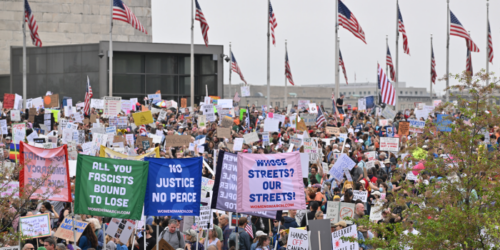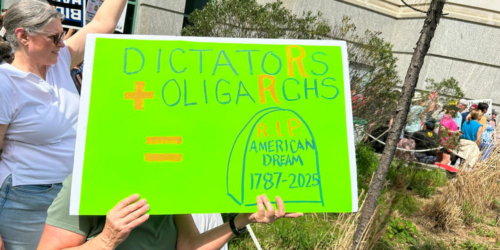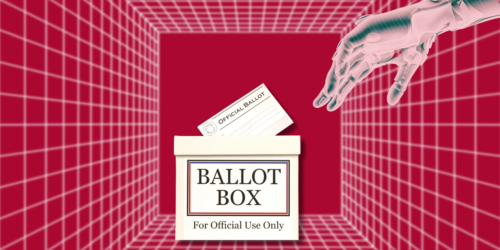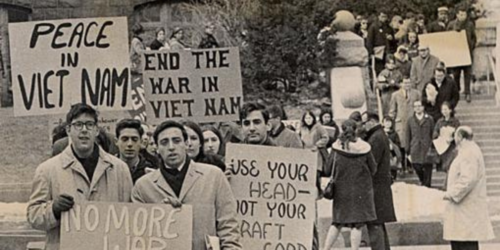Since the October 7 attacks on Israel, the U.S. has seen hundreds of vigils, rallies, demonstrations, and protests in response to those attacks and the political and military reactions to them.
Specifically, in those 10 days, CCC has recorded roughly 270 U.S. events expressing solidarity with Israel, compared with nearly 200 in support of Palestine. Using our (conservative) counting methods, we estimate similar total crowd sizes across those two sets: nearly 90,000 for both. We have seen reports or visual evidence of crowd size at a smaller share of pro-Israel events, however — only 67%, compared with 85% for the pro-Palestine events — so our estimate for the former is probably more of an undercount than the one for the latter.
- The largest pro-Israel event we’ve recorded so far was a rally outside Chabad Lubavich in Crown Heights, Brooklyn, on October 9, with a crowd size described by one source as “thousands” and another as “20,000“. The largest pro-Palestine event was a rally and march near the Israeli consulate in Los Angeles on October 14, with a crowd size described by various sources as “thousands“, “easily a few thousand“, and “tens of thousands“.
- So far, we have seen an almost identical number of protests with at least 1,000 participants across both sets: 22 in support of Israel, and 21 in support of Palestine.
Apart from the political claims they have made, the sharpest contrasts between the two sets of events have come in a) the frequency and character of counter-protests and b) the frequency with which elected officials have joined the crowds.
Across the nearly 270 pro-Israel events, we have seen reports of counter-protests at just 10 of them, or 3%. At only one of those 10 events — at UC Berkeley on October 10 — did pro-Palestine counter-protesters directly confront and then physically fight with rally-goers. At another, in LA, a group of students who shouted at pro-Israel demonstrators from their car were allegedly surrounded and threatened with a knife while another standing nearby with a flag was shoved and spit on. None of the other eight situations escalated beyond verbal clashes, according to our sources.
By contrast, some 67 of the 199 pro-Palestine events we have recorded, or 34%, have seen counter-protests. While most of those counter-protests have not escalated beyond verbal clashes, violence initiated by counter-protesters has been more frequent and, in some cases, more intense. For example:
- In Harrisburg, Pennsylvania, on October 13, a man got out of his car at a rally of Palestinian-American families, shouted racial slurs, and brandished a gun at the crowd before fleeing. He was arrested the next day.
- During a pro-Palestine rally in Fort Lauderdale, Florida, on October 8, a group split off from a larger crowd of pro-Israel counter-protesters to confront a small group of the rally-goers, reportedly punching one in the face and pepper spraying the group. Police on the scene made no arrests.
- At that large gathering in LA on October 14, several men wearing Israeli flags approached and scuffled with pro-Palestine rally-goers, and then one sprayed the nearby crowd with pepper spray. No arrests were made.
- In Kirkland, Washington, on October 8, a group of pro-Israel counter-protesters reportedly approached pro-Palestine ralliers, spit on them, and started throwing punches, leading to scuffles that police on the scene broke up. Police on the scene made no arrests.
As noted above, we have also seen a sharp contrast in the frequency with which elected officials have participated in these events. Specifically, we have seen reports of elected officials at 60 pro-Israel events in the past 10 days, compared with just four pro-Palestine events. The elected officials present at those pro-Israel events have ranged from city council members and state lawmakers to state governors and U.S. senators and representatives. The highest level of elected official we have seen reported at a pro-Palestine event is an appointed state legislator in Colorado whose refusal to specifically condemn Hamas at a rally in Denver on October 7 led to calls for his ejection from the legislature.
As always, our collection is ongoing, so these statistics will probably change marginally as we learn of events we’d previously overlooked, or find new information about ones we’d already seen. We also know that we will never achieve a complete record of all relevant events, and we know that these statistics grossly flatten a complex and emotionally profound array of experiences and concerns. That said, we hope they can provide some factual context for discussions and analysis of the popular response to the ongoing surge in violence in Israel and Gaza.




